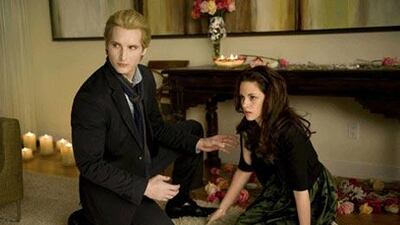Step down, nerds. Put out your lightsabres. Science fiction and fantasy are no longer solely your preserve. A British survey has revealed that both genres are becoming more acceptable in normal society, with sales of science fiction and fantasy novels growing by almost 20 per cent in the past five years. Now, says the Mintel survey, nearly one in three children and teenagers will admit to enjoying these kinds of books without fear of being given a wedgie and booted in the playground. (It doesn't say the last part, but come on, admit it: that's the treatment such geeky admissions earned you before now.)
And the cause of this mysterious development? Call it the Twilight effect. For those who do not enjoy the faculties of sight or sound, Twilight is, of course, the hit book series about vampires, penned by the American author Stephenie Meyer. On the last stocktake, it had sold a zillion copies in as many languages around the world. Then came the film instalments. Now, the first two of four planned screen adaptations have been unleashed on the fluttering hearts of every teenage girl on the planet. No doubt there are mud huts in remote South African villages with posters of Robert Pattinson draped across them.
The spectacular success of the Twilight juggernaut has generously spread itself out, boosting sales of other science fiction and fantasy books. In recent years, the British writer Neil Gaiman has inched up the Amazon sales chart with his Sandman comic book series. The Mintel analyst Pat Neviani-Aston cited authors such as Anne Rice, Ramsey Campbell and Ted Naifeh as other examples of those helping the trend along.
So why have they all become more popular now? Such novels have always been a good source of escapism. But now more than ever, the stories have become believable. Gone are the wart-ridden aliens and fire-breathing dragons of yesteryear. Out with the twee, squeaking ewoks of Star Wars and the pointy, rubber ears from the good Starship Enterprise. Twilight takes an ordinary girl, Bella, living a fairly normal American teenage life until she goes and falls in love with a vampire. But the vampires in this story don't wander about in Gothic cloaks with blood dribbling from their mouths. They join in at school, play sports and drive cars.
"Oh, why can't we have a vampire boyfriend?" moan young girls (and plenty of fully grown women) after falling for Edward Cullen in Twilight. The increased popularity of the genres is showing on the small screen, too. The revamped Doctor Who on the BBC has been a runaway success in recent years, and other television shows such as Battlestar Galactica, Heroes and even Lost are said to have helped boost science fiction's tarnished reputation. It's now perfectly socially acceptable, for instance, to watch the Sci Fi Channel.
As ever, Hollywood is also muscling in on the action, most recently, with the inescapable popularity of Avatar. But 2010 will be continue to be marked by other big-budget fantasy or science fiction films. There is Inception, a Christopher Nolan film that is being called a "contemporary sci-fi" flick. The tagline? "Your mind is the scene of the crime." Ooh, spooky. Then there's Tron Legacy, a sequel to the 1982 film Tron, and a vampiric adaptation of Tom Stoppard's Rosencrantz and Guildenstern Are Dead, drolly entitled Rosencrantz and Guildenstern Are Undead. And Simon Pegg will rear his shiny head with Paul, a film about two comic book geeks who discover an alien while travelling across America.
Resistance is futile, people. Best get in on some nerd action now.

